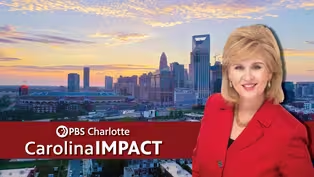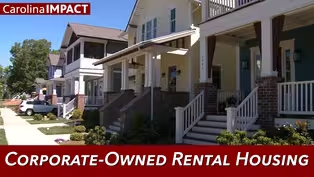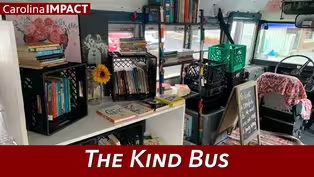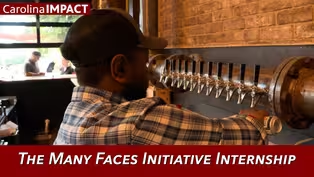
HBCUs in the New Millennium
Clip: Season 12 Episode 1202 | 5m 59sVideo has Closed Captions
Local HBCUs are stepping up to meet student's needs in the new millennium.
They’re called HBCUs, historically black colleges and universities. The first one was founded in 1837 in Pennsylvania by a quaker philanthropist long before the Civil War. These days, about a hundred HBCUs exist in the U.S. How are they meeting the changing needs of the students they serve? We show you how schools here in the Carolinas are stepping up to meet today’s demands.
Problems playing video? | Closed Captioning Feedback
Problems playing video? | Closed Captioning Feedback
Carolina Impact is a local public television program presented by PBS Charlotte

HBCUs in the New Millennium
Clip: Season 12 Episode 1202 | 5m 59sVideo has Closed Captions
They’re called HBCUs, historically black colleges and universities. The first one was founded in 1837 in Pennsylvania by a quaker philanthropist long before the Civil War. These days, about a hundred HBCUs exist in the U.S. How are they meeting the changing needs of the students they serve? We show you how schools here in the Carolinas are stepping up to meet today’s demands.
Problems playing video? | Closed Captioning Feedback
How to Watch Carolina Impact
Carolina Impact is available to stream on pbs.org and the free PBS App, available on iPhone, Apple TV, Android TV, Android smartphones, Amazon Fire TV, Amazon Fire Tablet, Roku, Samsung Smart TV, and Vizio.

Introducing PBS Charlotte Passport
Now you can stream more of your favorite PBS shows including Masterpiece, NOVA, Nature, Great British Baking Show and many more — online and in the PBS Video app.Providing Support for PBS.org
Learn Moreabout PBS online sponsorship- [Beatrice] They're known as HBCUs, Historically Black Colleges and Universities.
And for more than 187 years since the first school, Cheyney University opened in Pennsylvania, they've educated the sons and daughters of formerly enslaved people.
But talk to any HBCU president and they will tell you, it's not been an easy road.
- There are lots of challenges, especially in higher education, particularly with Historically Black Colleges and Universities.
- [Beatrice] Meet Johnson C. Smith University's president and alum, Dr. Valerie Kinloch.
- For the last 20 years, we've been trying to find our way, find our way back.
And I believe that today, we are closer than we've ever been.
- [Beatrice] And Barber-Scotia president, Chris Rey, a former small town mayor and military retiree.
- You don't have to go where you're tolerated.
You can go where you're celebrated.
- [Beatrice] And Dr. Anthony Davis at Livingstone College in Salisbury.
Nationally, there are 101 current HBCUs.
There are 11 active in North Carolina, 10 of which are accredited.
North Carolina has the most enrolled Black undergraduate students in the United States and the second most HBCUs in the nation.
(upbeat music) With more than 1,300 students, Johnson C. Smith is ranked as the number one private HBCU in North Carolina by US News and World Report, and it's a cornerstone for the historic West End in Charlotte.
Is president points out, "HBCUs feel an important and changing niche in higher education."
- I think a shift needs to happen in terms of how people understand the role and responsibility of Historically Black Colleges and Universities and how we've always been leaders when we talk about educational opportunities for our students.
- [Beatrice] Founded in 1879 in Salisbury by the AME Zion Church, Livingstone is where the first Black intercollegiate football game was played in 1892 and it produced America's first Black neurosurgeon.
Now its president says, "The new focus is to aid students who had left out."
- Me being present in Livingstone is humbling for me to think that someone who spent their entire life in foster care, 17 years, nine months is now the president of one of our 103 HBCUs that are left.
- [Beatrice] The school received more than 6,800 applications for this fall semester.
They accepted 500, admitting 25% more students and they expect to hit 1,000 students this fall.
Among them, students in a newly developed program for those who age out of foster care.
- Here's a data point.
85% of young men and women who age out of foster care want to go to college, but only 3% go.
One student was dropped off at the gate by his social worker, just dropped him off at the gate with his items in a garbage bag.
(trumpet honking) - [Beatrice] Meanwhile, at Barber-Scotia in Concord, a former small town mayor and military veteran sees his charge starting at a deeper level, to bring a school back to full academic status.
- It's embarrassing.
It's a punch in the gut when you lose your accreditation.
- [Beatrice] Being installed as Barber-Scotia's 13th president after joining the school a year ago, comes with pomp and circumstance as well as honor.
Yet, the former mayor of Spring Lake, North Carolina is approaching getting the school founded in 1867 back on track as a business similar to the reasons why it was started.
It became co-ed in 1954, but in 2004, it lost its accreditation under previous administrations.
But something many don't know, Barber-Scotia never closed its doors, continuing to provide students services for the alums and some online classes.
Now the school has started the race toward re-accreditation.
- Since the gun is fired, there will be the tracks will have to come on campus.
They'll have to do an assessment, they have to do interviews, they have to look at our systems.
We have to do a self-study.
- [Beatrice] The school is also joining the New South Athletic Conference, which serves smaller schools as a way of attracting students.
Yet all these presidents do point out that a key factor for higher education is funding.
More than 1,300 students are enrolled this year.
At the start of the fall semester, Johnson C. Smith launched an emergency aid campaign for 300 students, and they raise more than 300,000 in a week.
- But at the end of the day, the thing that is oftentimes devastating is when we have students who want to be at JCSU but who cannot afford to stay.
- Higher education has changed a lot in the 20 years since Barber-Scotia lost his accreditation.
And so I, as the new president, along with the board of trustees and my faculty and staff, we have to approach this now, not with traditional eyes.
- [Beatrice] And at Barber-Scotia, they're doing more than marking the investiture of a new president.
They're looking at how they can become the hometown college in Cabarrus County.
- If you are a graduate of a Cabarrus County High School, and then you have a 2.0 GPA, you are automatically enrolled.
You are automatically enrolled at Barber-Scotia College.
- We represent 3% of all colleges and universities in the United States.
But when you take a look at our output data, we're punching well above our fighting weight.
- [Beatrice] For now, it's the start of a new year for the east college students.
And for HBCU presidents, it marks the beginning of another year where they lead the charge to fight for their students and their education.
For "Carolina Impact", I'm Bea Thompson.
Carolina Impact | September 24th, 2024
Preview: S12 Ep1202 | 30s | Corporate-Owned Rental Housing, HBCU's in the New Millennium, Many Faces Initiative, & The Kind Bus. (30s)
Corporate-Owned Rental Housing
Video has Closed Captions
Clip: S12 Ep1202 | 5m 52s | Charlotte ranks high in single-family rentals, impacting people looking to buy homes. (5m 52s)
Video has Closed Captions
Clip: S12 Ep1202 | 5m 22s | A York, SC woman turns a school bus into a bookmobile known as The Kind Bus (5m 22s)
The Many Faces Initiative Internship
Video has Closed Captions
Clip: S12 Ep1202 | 5m | A local brewery wants to make the industry more inclusive through hands-on internships. (5m)
Providing Support for PBS.org
Learn Moreabout PBS online sponsorship
- News and Public Affairs

Top journalists deliver compelling original analysis of the hour's headlines.

- News and Public Affairs

FRONTLINE is investigative journalism that questions, explains and changes our world.












Support for PBS provided by:
Carolina Impact is a local public television program presented by PBS Charlotte



